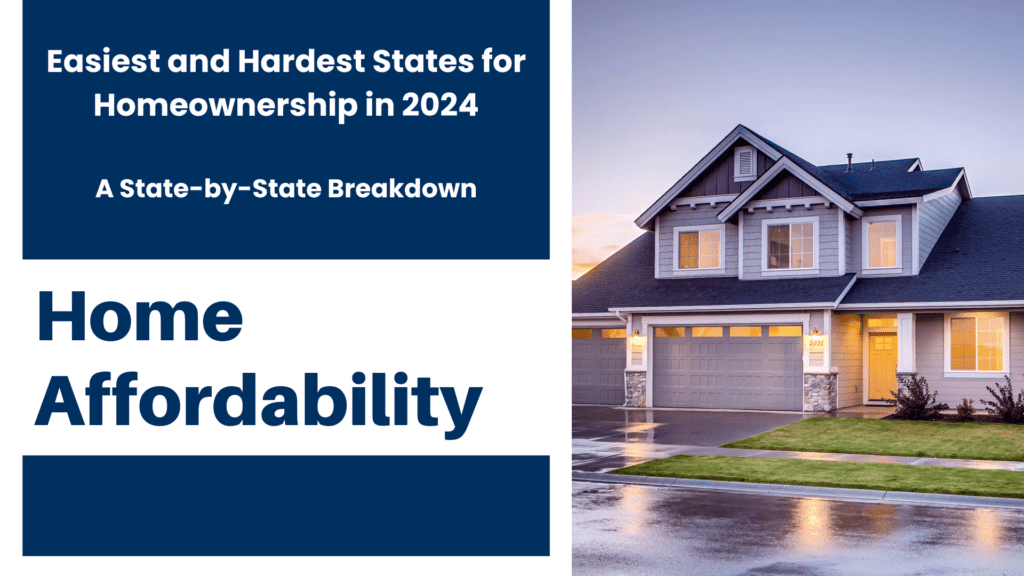States Ranked by Affordability and Credit Scores
If you’re looking to buy a home, your chances vary widely depending on the state. In 2024, states like West Virginia and Mississippi offer the best odds for affordable homeownership thanks to low median home prices and accessible credit requirements.
On the other hand, high-cost states such as California and Hawaii continue to pose challenges for prospective buyers, even for those with strong credit scores.
Your Chances of Buying a Home
In this guide, we’ll explore which states offer the easiest and hardest chances for buying a home. By looking at average credit scores, median home prices, and overall affordability, we can rank each state from the “worst chance” to the “best chance” for homeownership.
States with lower home prices and higher credit scores make it easier for people to buy homes, while states with higher costs can present greater challenges. This guide will help you understand which states align best with your homeownership goals and financial situation.
Worst Chance to Buy a Home
The following states have the highest barriers to homeownership due to high home prices and affordability challenges, even though many have above-average credit scores.
- California
- Average Credit Score: 722
- Median Home Price: $782,695
- Affordability: Very low, primarily due to high home prices.
- Hawaii
- Average Credit Score: 732
- Median Home Price: $856,327
- Affordability: Extremely low, with the highest home prices in the nation.
- New York
- Average Credit Score: 721
- Median Home Price: $458,072
- Affordability: Low, especially in urban areas like NYC.
- Massachusetts
- Average Credit Score: 732
- Median Home Price: $609,415
- Affordability: Challenging due to high housing costs.
- Washington
- Average Credit Score: 735
- Median Home Price: $588,986
- Affordability: Moderate to low because of high home prices.

Moderate Chance to Buy a Home
These states offer moderate levels of affordability and reasonable credit score requirements, making homeownership somewhat more accessible.
- Colorado
- Average Credit Score: 731
- Median Home Price: $548,602
- Affordability: Moderate, though high prices may still pose challenges.
- New Jersey
- Average Credit Score: 725
- Median Home Price: $508,430
- Affordability: Moderate; higher incomes help offset costs.
- Oregon
- Average Credit Score: 732
- Median Home Price: $497,249
- Affordability: Moderate but slightly strained by higher home prices.
- Maryland
- Average Credit Score: 716
- Median Home Price: $413,065
- Affordability: Balanced by higher incomes.
- Utah
- Average Credit Score: 731
- Median Home Price: $518,241
- Affordability: Challenging, even with high credit scores.
Better Chance to Buy a Home
With more affordable home prices and favorable credit scores, these states make it relatively easier to buy a home compared to the previous groups.
- Nebraska
- Average Credit Score: 731
- Median Home Price: $255,935
- Affordability: Good; home prices are moderate and accessible.
- Kansas
- Average Credit Score: 723
- Median Home Price: $222,704
- Affordability: Very good, thanks to lower home prices.
- Michigan
- Average Credit Score: 719
- Median Home Price: $238,220
- Affordability: Good; affordable housing costs support ownership.
- Wisconsin
- Average Credit Score: 737
- Median Home Price: $293,023
- Affordability: Good, with high credit scores and affordable home prices.
- North Dakota
- Average Credit Score: 733
- Median Home Price: $252,426
- Affordability: Very good, with both high credit scores and affordable home prices.
Best Chance to Buy a Home
These states offer the easiest path to homeownership thanks to low home prices and relatively accessible credit scores.
- West Virginia
- Average Credit Score: 703
- Median Home Price: $160,044
- Affordability: Excellent, with very low housing costs.
- Mississippi
- Average Credit Score: 675
- Median Home Price: $177,699
- Affordability: Very good; low home prices balance lower credit scores.
- Arkansas
- Average Credit Score: 696
- Median Home Price: $202,520
- Affordability: Excellent, with low housing costs.
- Oklahoma
- Average Credit Score: 696
- Median Home Price: $202,848
- Affordability: Good; affordable housing and moderate credit scores.
- Indiana
- Average Credit Score: 713
- Median Home Price: $235,465
- Affordability: Good; moderate housing costs support ownership.
Conclusion
In this analysis, we ranked U.S. states from the most challenging to the easiest for buying a home. States like California, Hawaii, and New York have high home prices, making it difficult to buy a home even with good credit scores.
On the other hand, states like West Virginia, Mississippi, and Arkansas offer more affordable options, making it possible to buy a home even with lower credit scores. By considering these factors, prospective homebuyers can make informed decisions about where they might have the best or worst chances of achieving homeownership based on their financial profile.
Methodology
The methodology for ranking states from “worst” to “best” chance of buying a home in this analysis involved evaluating three main criteria: average credit scores, median home prices, and overall affordability. Here’s how each factor contributed to the rankings:
1. Average Credit Scores:
- Credit scores are essential for mortgage approval and affect the interest rates borrowers receive. Higher credit scores generally increase the likelihood of approval for conventional loans with better terms.
- States with higher average credit scores were favored, as residents are more likely to qualify for favorable mortgage options. Credit score data was sourced from reports by Experian and other credit agencies
2. Median Home Prices:
- Median home prices indicate the general cost of housing in each state. Lower home prices typically make it easier for residents to afford a home, especially for first-time buyers.
- States with lower median home prices received higher rankings due to their increased accessibility for prospective homeowners. Zillow and similar platforms were used for accurate, state-specific housing data.
3. Overall Affordability:
- Affordability was calculated by considering the ratio of median home prices to median household incomes. A lower price-to-income ratio suggests better affordability, as residents need a smaller portion of their income to cover housing costs.
- States with higher incomes relative to home prices were ranked more favorably. Data on median incomes and general affordability was drawn from sources like the U.S. Census Bureau and the Federal Reserve Economic Data (FRED).
Grouping and Ranking:
- Worst Chance to Buy a Home: States with high home prices and low affordability, despite good credit scores, were categorized here. These states, such as California and Hawaii, are expensive and present significant barriers to homeownership.
- Moderate Chance to Buy a Home: States with moderate home prices and credit scores, where affordability was reasonable but not ideal, were included in this category. States like Colorado and New Jersey were ranked here due to their balanced affordability and income levels.
- Better Chance to Buy a Home: States with lower home prices and favorable credit scores were grouped here, as they offered better accessibility to homeownership. States like Kansas and Michigan had relatively affordable housing costs and good credit score profiles.
- Best Chance to Buy a Home: States with the highest affordability, typically due to low home prices, even if credit scores were somewhat lower, ranked as having the best chances. West Virginia and Mississippi, for example, had very low home prices, making them accessible for many buyers.
References
- U.S. Census Bureau: Offers information on median household incomes by state, which helps assess affordability and purchasing power across different regions.
- Experian and MyFICO: Sources for average credit score data by state, providing an understanding of creditworthiness and approval odds.
- Zillow Research: Provides median home prices for states and local markets, crucial for evaluating affordability and market trends.
- Federal Reserve Economic Data (FRED): Offers additional data on housing trends, affordability, and economic conditions, supporting broader market analysis.
These references cover a wide range of metrics, from housing costs to credit scores, and offer valuable context for understanding the challenges and opportunities for homeownership in various states.



